Pheidole fervens F Smith - majors
 Return to
species page Return to
species page
|
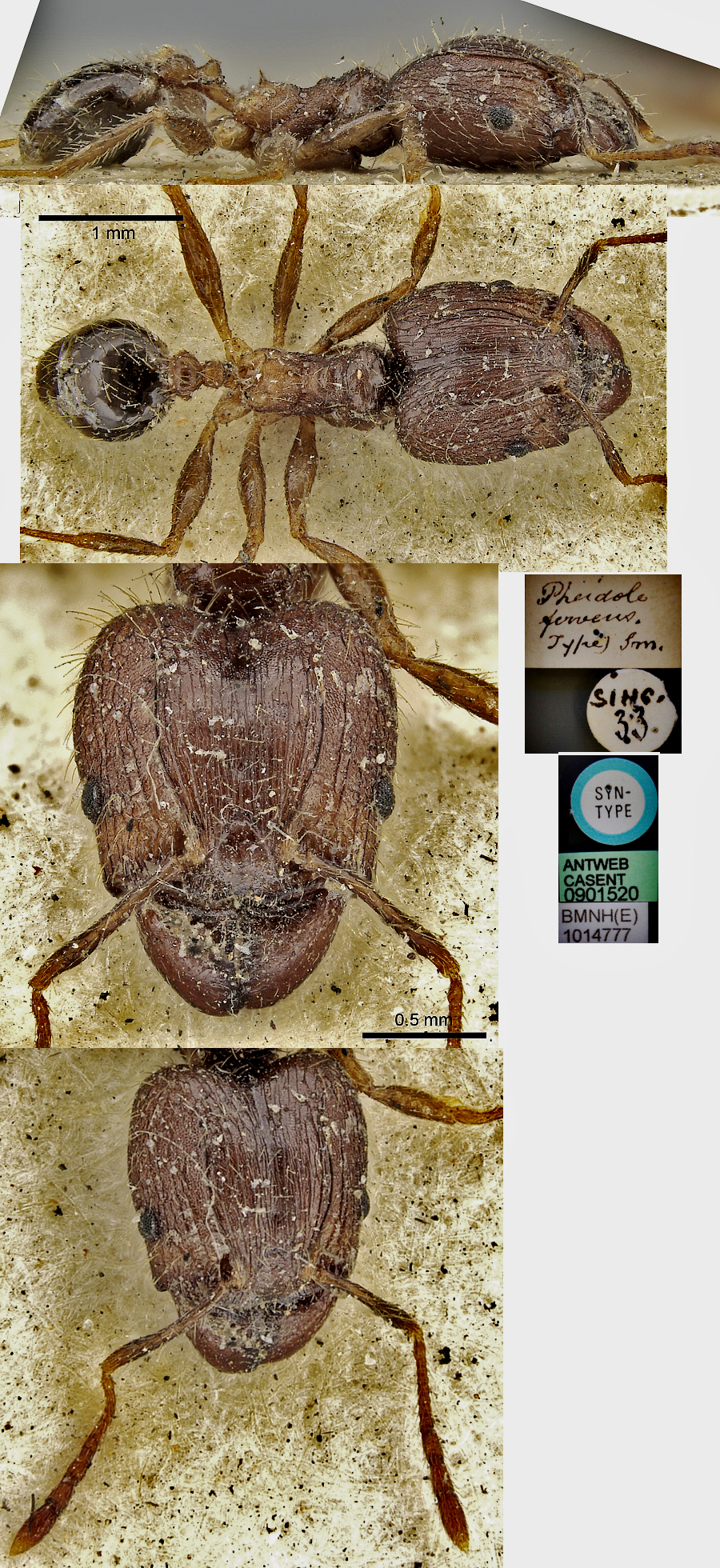 The photomontage of a
syntype major worker is collated
from http://www.antweb.org/specimen.do?name=casent0901520.
Accessed 15.x.2012 (contrast adjusted for clarity). The photomontage of a
syntype major worker is collated
from http://www.antweb.org/specimen.do?name=casent0901520.
Accessed 15.x.2012 (contrast adjusted for clarity).
|
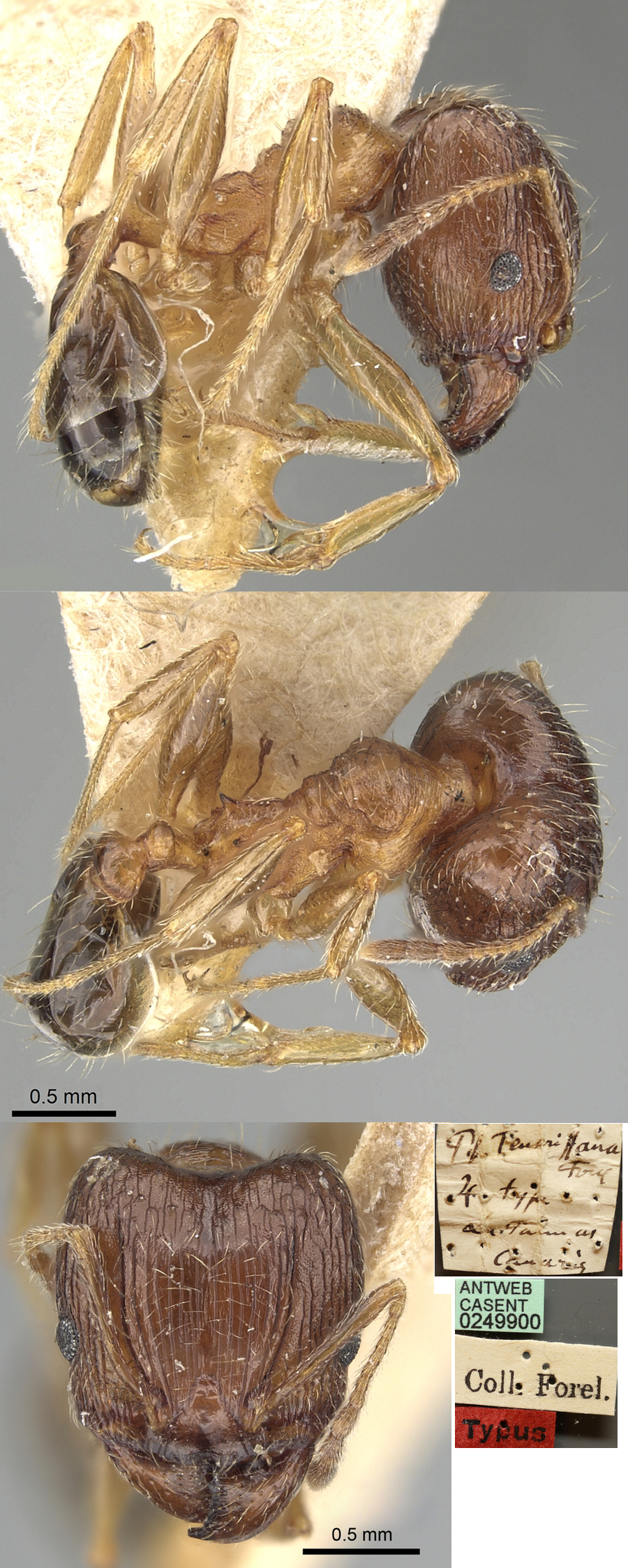 The photomontage of the
teneriffana type major worker is collated
from http://www.antweb.org/specimen.do?name=casent0249900.
Accessed 15.x.2012. The photomontage of the
teneriffana type major worker is collated
from http://www.antweb.org/specimen.do?name=casent0249900.
Accessed 15.x.2012.
By using the layering and opacity tools of routine imaging software, there
is no clear difference of any kind between the above two major workers.
|
MAJOR - new description TL ca 4.5 mm; CI 90-93 SI
52-58 OI 16 PPW/HW 46-49
Head in full face view with near straight sides, slighlty diverging
from front to back; with a deeply impressed occiput; longitudinal
striations reaching the occiput and often strongly marked; with a
distinct antennal scrobe that has weakly spiculate base sculpture
Mandibles smooth and shiny
Clypeus smooth and shiny without a distinct median longitudinal carina
Frontal carinae long and strongly divergent posteriorly, reaching the
posterior quarter of the head and antennal scrobes distinct
Antennae with both scapes and funiculi slender but moderately long
Eye fairly small and near circular (12 facets long X 10 wide); set 1.5
X its own length back from the lateral margin of the clypeus
Hypostoma with a small median tooth, small submedian teeth and small
lateral teeth
Underside of head weakly striate and shiny
Alitrunk profile irregular with a high domed pro-mesonotum; there is a
very distinct transverse welt on the mesonotum which angles downwards
posteriorly into a shallow but quite wide metanotal groove
The propodeum profile is flat but slopes downwards from front to back,
with strong triangular teeth; from above it is weakly margined but
there is no longitudinal groove
The petiole in profile has a fairly long pedicel which rises evenly
from the anterior to the base of the node; that is a moderately high
triangle with the upper margin narrowly rounded and entire, the
posterior face is near vertical
The postpetiole is small and globular in profile; from above it is more
than twice as wide as the petiole and has sharply conical lateral apices
The gaster is almost as large as the head and evenly globular, without
a distinct anterior margin
Erect pilosity quite long, fine and abundant; on the gaster the hairs
are shorter and even more abundant; the pubescence is short, adpressed
but quite sparse.
The sculpturation on the anterior of the head is of strong longitudinal
striations with no reticulation, the posterior of the head on the sides
also is striated; the alitrunk apart from the pronotum dorsum which has
weak transverse rugae, has longitudinal striations overlying loose
puncturation, the dorsum of the propodeum has weak transverse striations
Overall quite shiny, with the gaster very smooth and glossy
General colour very variable from nest to nest, from yellow-brown to
red-brown even to near black, with the gaster much the same colour
|
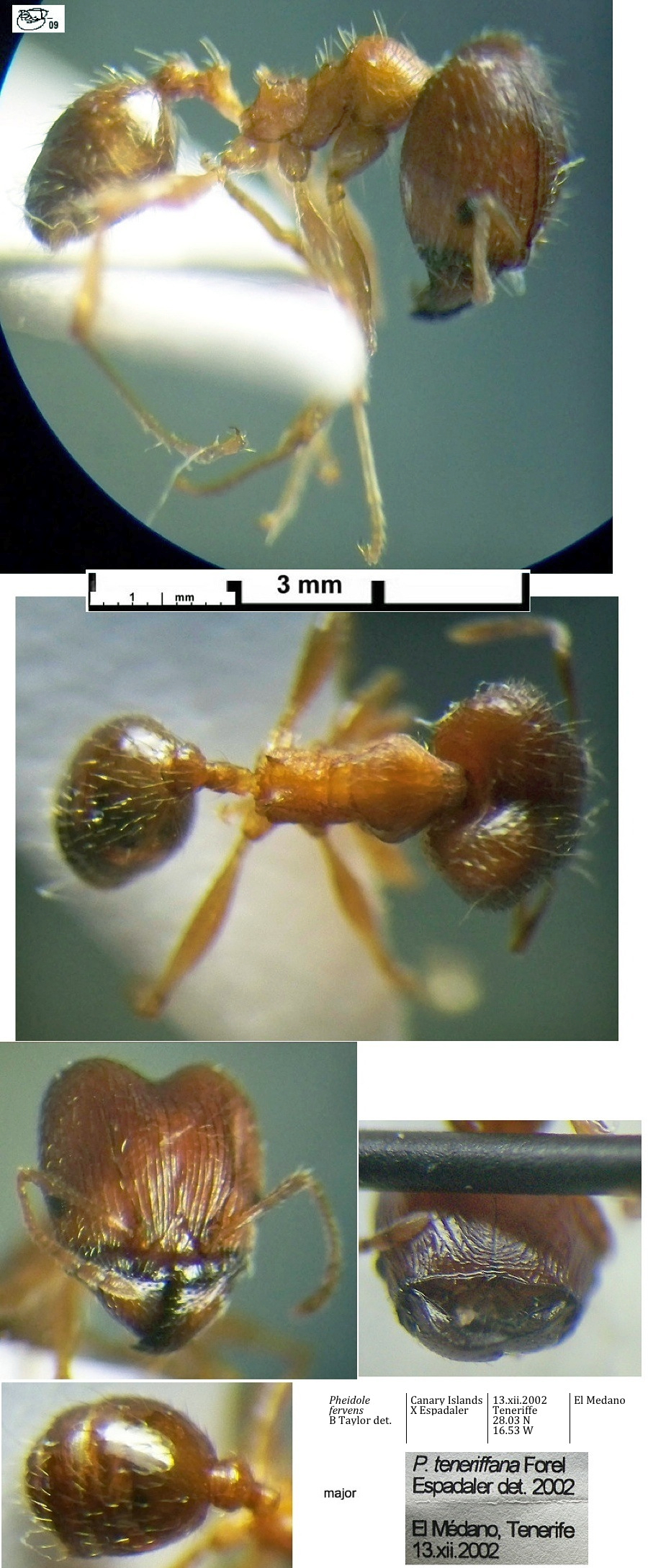 The photomontage here is
of a major worker from El Medano, Teneriffe, Canary Islands; collected
and identified
as teneriffana by Xavier
Espadaler. The photomontage here is
of a major worker from El Medano, Teneriffe, Canary Islands; collected
and identified
as teneriffana by Xavier
Espadaler.
|
 The photomontage here is
of a major worker from Tarragona, Spain; collected and identified as teneriffana by Xavier Espadaler. The photomontage here is
of a major worker from Tarragona, Spain; collected and identified as teneriffana by Xavier Espadaler.
|
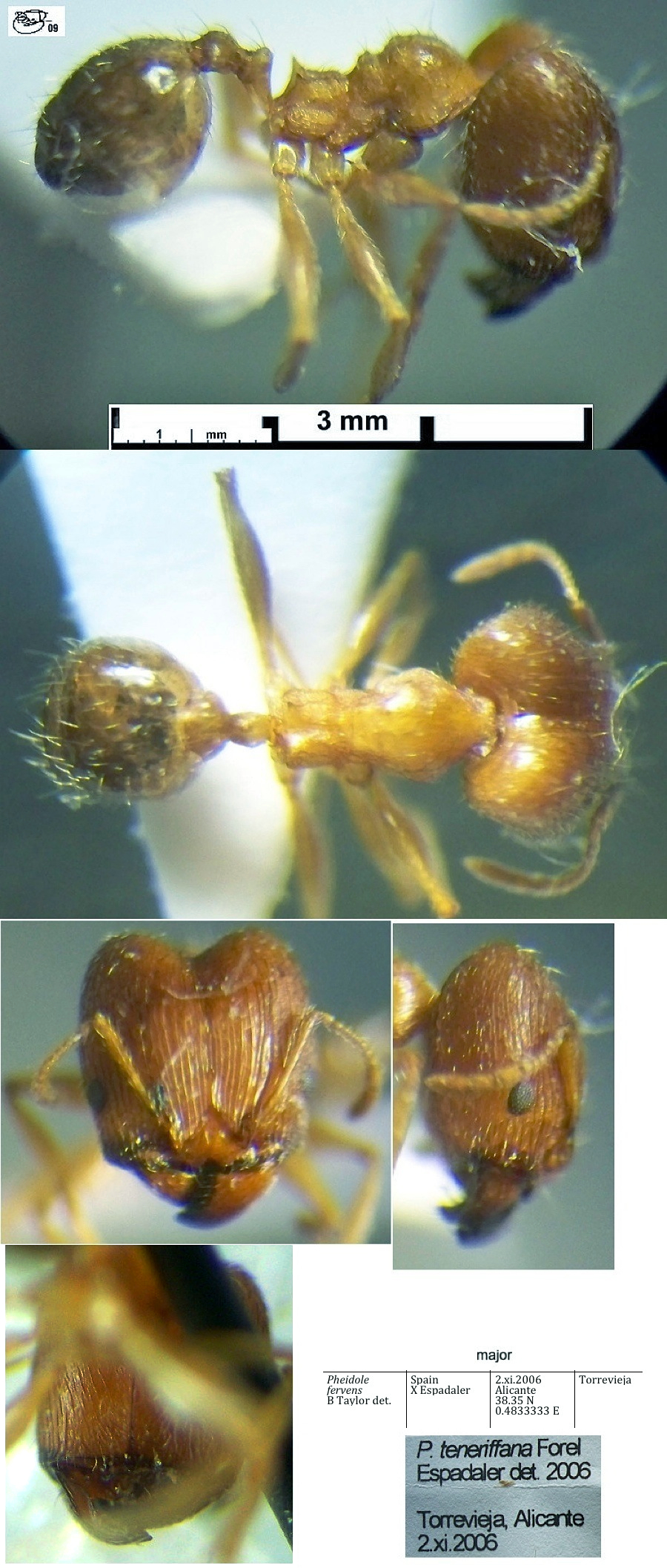 The photomontage here is
of a major worker from Alicante, Spain; collected and identified
as teneriffana by Xavier
Espadaler. The photomontage here is
of a major worker from Alicante, Spain; collected and identified
as teneriffana by Xavier
Espadaler.
|
 The photomontage here is
of a major worker from Ibisa, Balearics; collected and identified
as teneriffana by Xavier
Espadaler. The photomontage here is
of a major worker from Ibisa, Balearics; collected and identified
as teneriffana by Xavier
Espadaler.
|
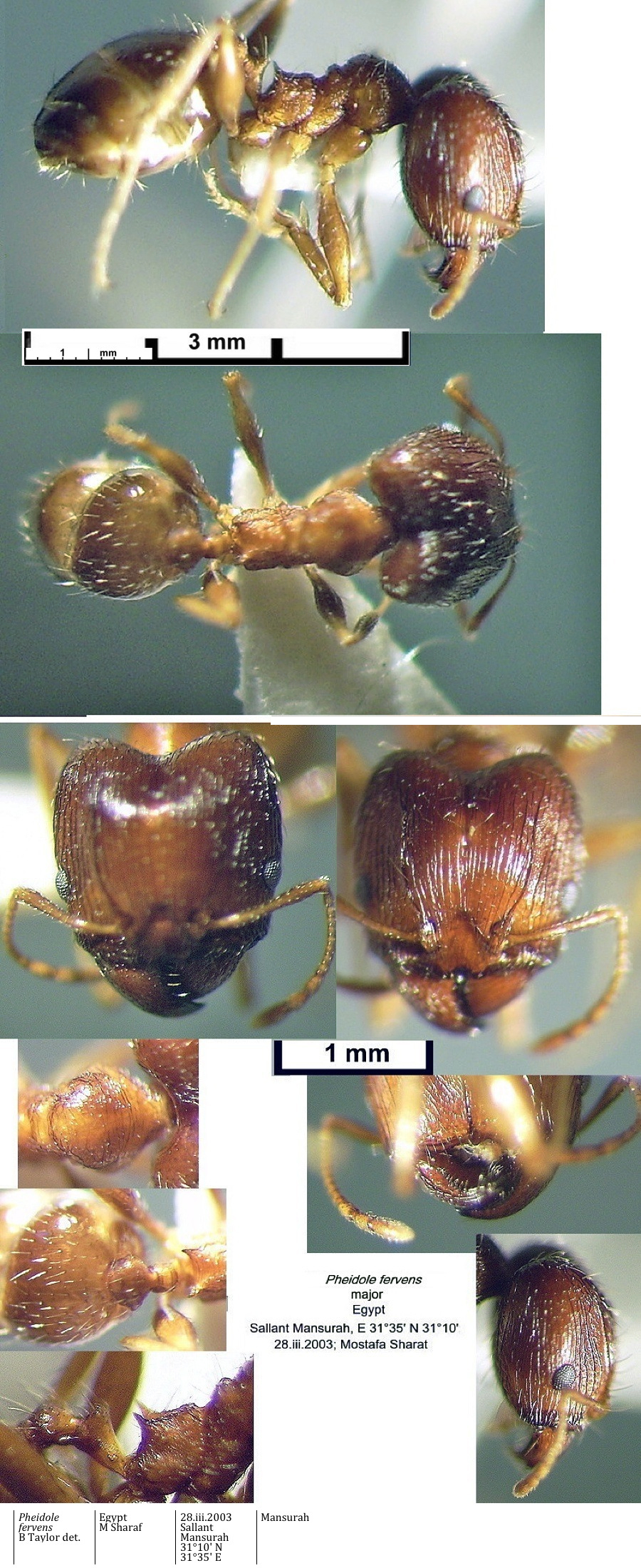 The photomontage here is
of a major worker from Egypt, Sallant Manmsurha; collected and
identified
collected and identified as teneriffana
by Mostafa Sharaf, 28.iii.2003. The photomontage here is
of a major worker from Egypt, Sallant Manmsurha; collected and
identified
collected and identified as teneriffana
by Mostafa Sharaf, 28.iii.2003.
|
 The photomontage here is
of a major worker from Egypt, Hawamdyia, Giza, N 30°01' E 31°13';
20.xii.1998; collected and identified as teneriffana
by Mostafa Sharaf. The photomontage here is
of a major worker from Egypt, Hawamdyia, Giza, N 30°01' E 31°13';
20.xii.1998; collected and identified as teneriffana
by Mostafa Sharaf.
|
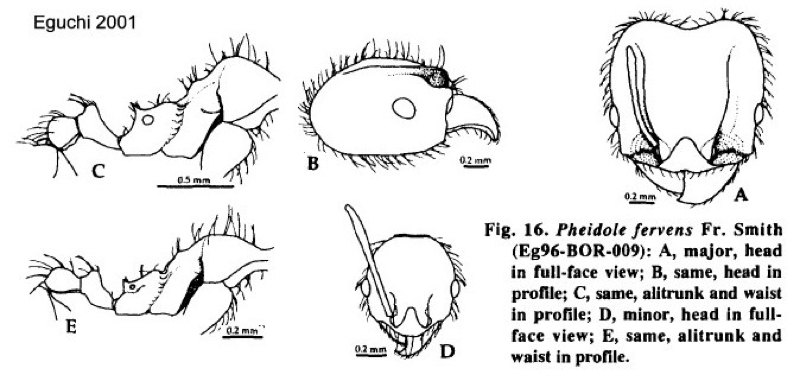 The
above specimens, some originally labelled as P. teneriffana,
and their minors (see the respective page) clearly match the Eguchi
(2001) illustration and description, although ours are bigger [Eguchi's
(2001) note is at The
above specimens, some originally labelled as P. teneriffana,
and their minors (see the respective page) clearly match the Eguchi
(2001) illustration and description, although ours are bigger [Eguchi's
(2001) note is at  ]. ].
|
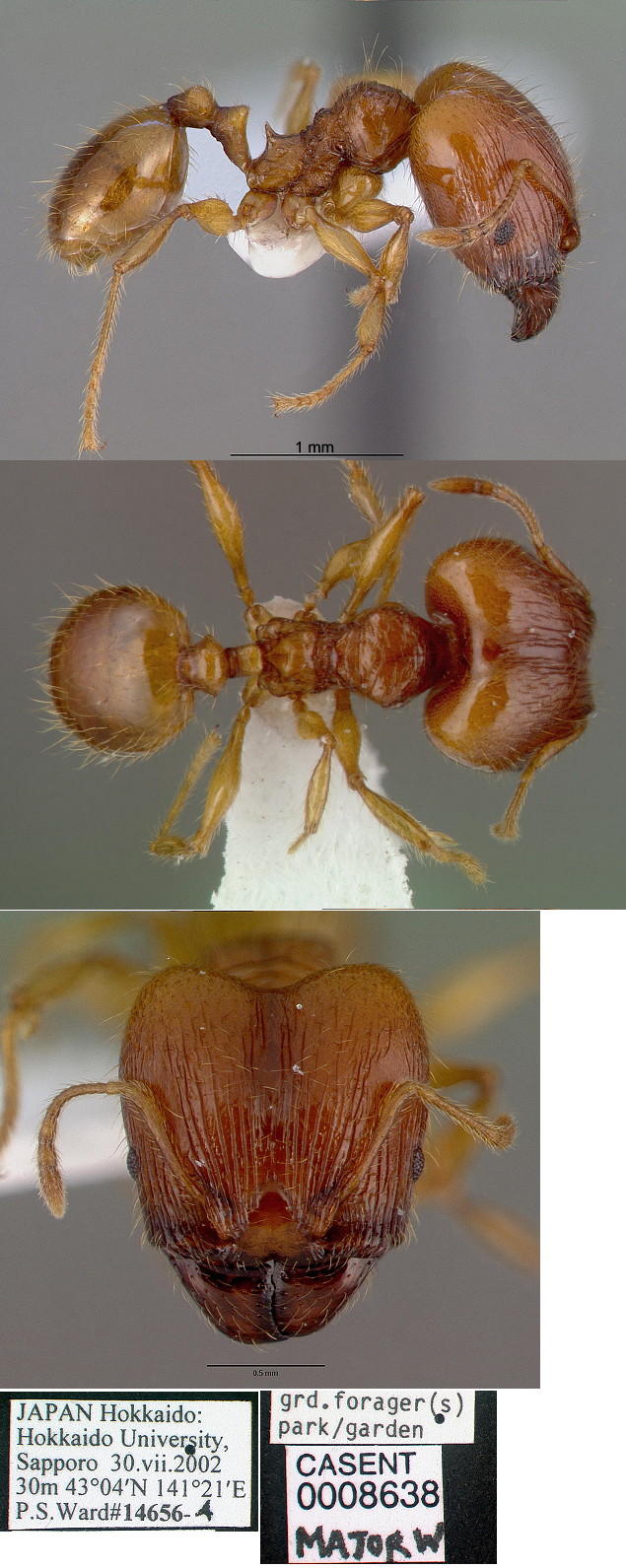 This
Antweb major from Hokkaido, Japan, also matches ours and Eguchi's. http://www.antweb.org/specimen.do?name=casent0008638&shot=p&project= This
Antweb major from Hokkaido, Japan, also matches ours and Eguchi's. http://www.antweb.org/specimen.do?name=casent0008638&shot=p&project=
|
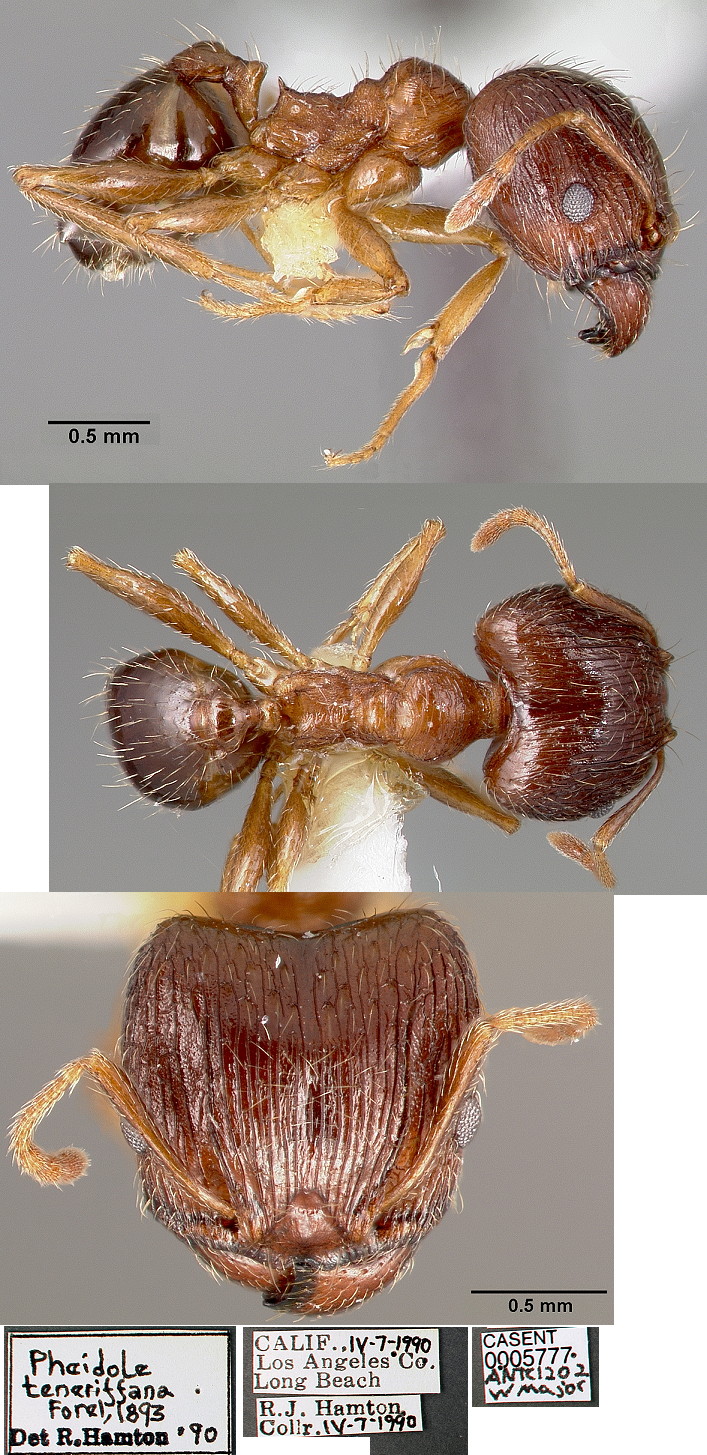 A
major specimen labelled as Pheidole teneriffana from California
(presumably those described by Snelling, 1992b: 121) again is close to
ours , specially those from Egypt (top); collated from http://www.antweb.org/specimen.do?name=casent0005777. A
major specimen labelled as Pheidole teneriffana from California
(presumably those described by Snelling, 1992b: 121) again is close to
ours , specially those from Egypt (top); collated from http://www.antweb.org/specimen.do?name=casent0005777.
|
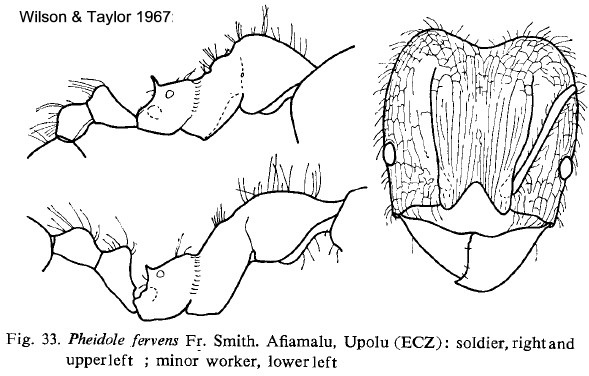 This
drawing and description by Wilson & Taylor (1967), however, is
really rather different. The sculpturation on the head is much less
prominent; the transverse welt on the mesonotum is much less
pronounced; and the propodeal spines are much smaller and more acute
[Wilson & Taylor's (1967) note is at This
drawing and description by Wilson & Taylor (1967), however, is
really rather different. The sculpturation on the head is much less
prominent; the transverse welt on the mesonotum is much less
pronounced; and the propodeal spines are much smaller and more acute
[Wilson & Taylor's (1967) note is at  ]. This and the specimen below are similar. ]. This and the specimen below are similar.
To us, they appear to be variants of Pheidole
oceanica, for which we provide a comparison page.
|
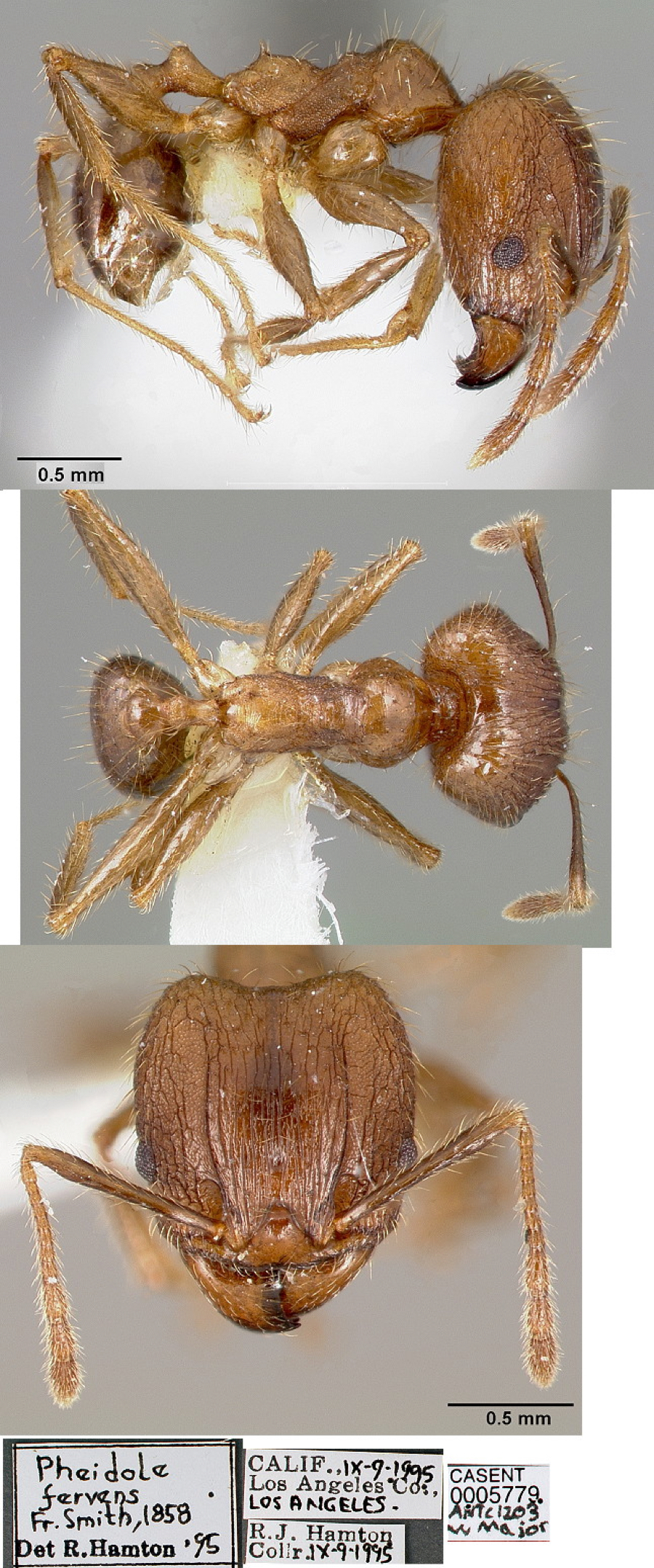 Antweb
major http://www.antweb.org/specimen.do?name=casent0005779 Antweb
major http://www.antweb.org/specimen.do?name=casent0005779
|